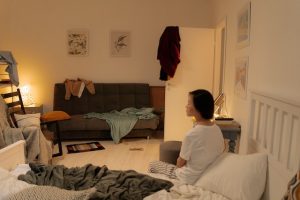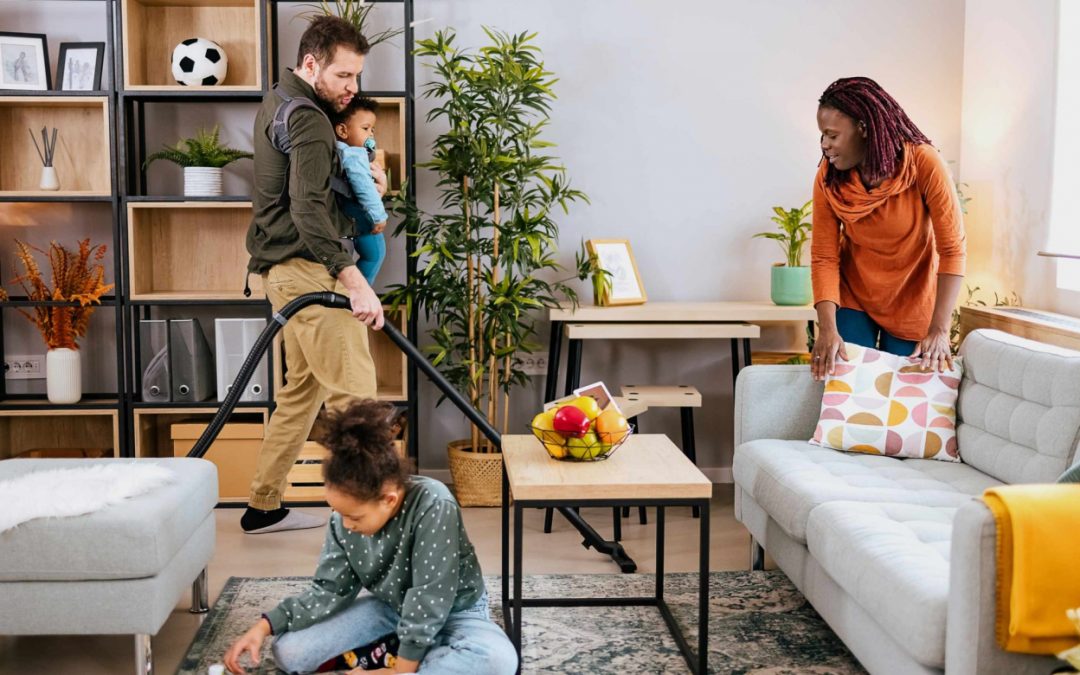Written by: Jena, The Wellness Resolution 100% (NO Ai was used) 
Clutter can cause stress in your life without you even realizing it. It can cause mental clutter. Just to be clear, having clutter does not make you a hoarder. Even if you consider yourself pretty organized, you can still learn something from this. I thought I understood clutter, until I had an organizing client.
Clutter around you, clutter in your life, can cause mental clutter. Clutter can affect your emotional state, it can steal away your time, it is distracting, it can sabotage your dreams, and even affect your health. Too much clutter can cause troubles sleeping, poor eating choices, allergies, anxiety, and more.
What Do I Know About Physical Clutter & Mental Clutter?
I did marketing for an organizing client for over five years. Even before that I’ve always been into organizing my belongings, everything having a place, and knowing where that place is. The only room that doesn’t have some sort of organization to it is my husband’s garage. I say it is his garage because I wouldn’t even know how to organize it if I had the time to. We did just move in the last year, so having one messy space isn’t that bad.
I’m not super organized, my house does get cluttered sometimes. I don’t always put things away. However, I declutter every week when I clean my house. After working with my client, I learned A LOT about what clutter really is, how to go about organizing, and how it has an affect on my life and my health. Organizing and decluttering can make a HUGE difference in a person’s day-to-day life.
What is Clutter?

This space doesn’t look cluttered, but maybe there is clutter in the form of objects the person really doesn’t like that are distracting or cause negative emotions.
Clutter is having too many items in a space, owning too many belongings, or having a bunch of disorganized items. HOWEVER, clutter is also owning belongings that you don’t want or need. This is one of the best organizing lessons I was taught. It doesn’t matter what you paid for it. The cost is already incurred (a sunk cost). If you don’t like an item, even if it is a gift, it is clutter that you should consider getting rid of.
When you keep things you don’t want or like they can get in the way of filling your home with things you do like, love, or value. How about all those items you haven’t touched in years that you think… “someday I might need that.” That is also clutter. Now, I definitely have some of those things too!
The question is how much space are those things taking up? How much would it cost you to buy that item again in the future if you really need it? Could a friend use it? Could you sell it for a good price? What is the cost of keeping it vs getting rid of it? What would you do with the extra space if you got rid of it?
Clutter Can Harm You Emotionally
Do you have an item associated with a bad memory or a difficult time in your life? Did a friend give you something that you no longer speak to? If an item is causing you some emotional stress or turmoil, it destroys the happy, cozy vibes you want to feel being at home. If an item brings up any negative feelings, no matter what the cost or who gave it to you, it might be time to get rid of it. You can actually feel anxiety toward an item in your house subconsciously without realizing it. So pay attention to what you keep in your home.
Your Items Represent You
 Your items are actually a representation of who you are now and who you want to be. Does it represent the lifestyle you live? Do you have the space to go about your regular routines? Your home should be a reflection of the current you and your current life, not the past you. Your home should be the place where you feel the most comfortable.
Your items are actually a representation of who you are now and who you want to be. Does it represent the lifestyle you live? Do you have the space to go about your regular routines? Your home should be a reflection of the current you and your current life, not the past you. Your home should be the place where you feel the most comfortable.
Do you keep clothes you haven’t worn in over a year? When you clean out your closet, if you haven’t worn it in a year, it might be time to donate it or sell it. Keep only the stuff you love so that is easier to get dressed in the morning. You will also have more room for things that you love.
Mental Clutter
Clutter on the outside can create clutter on the inside – you may have a hard time focusing, you might be easily distracted, struggle to find things, not properly prioritize, forget things, etc. Our minds can just be subconsciously stressed when we see clutter. Mental clutter can cause many different problems.
University of New Mexico’s Catherine Roster and colleagues (2016) examined how clutter compromises an individual’s perception of home, and ultimately feelings of satisfaction with life (Krauss, 2017). The study found that many people with cluttered homes struggled to feel pleasure in their own homes and were less satisfied with their lives.
Clutter causes stress. It can increase cortisol levels that can lead to anxiety and even depression.  Clutter is distracting. When you can’t find things, it sucks your time. Without some lists, plans, organized calendars, many people struggle to properly prioritize their work or life. So they don’t get things done right, on time, or forget to do something altogether.
Clutter is distracting. When you can’t find things, it sucks your time. Without some lists, plans, organized calendars, many people struggle to properly prioritize their work or life. So they don’t get things done right, on time, or forget to do something altogether.
In 2011, neuroscience researchers using fMRI (functional magnetic resonance imaging) and other physiological measurements found clearing clutter from the home and work environment resulted in a better ability to focus and process information, as well as increased productivity (Libby, 2019). However, there is an exception to this rule, studies have shown for creative souls a messy desk can help a person to be more creative.
As a creative, I like having tables that I can get paint all over and I like to spread out my art supplies. I often leave things sitting out so that I can easily go right back into a project. But if I have no room to work, then I have to organize a bit.
When you finish cleaning and organizing do you feel more relaxed and at ease in your home? Personally, I find it easier to cook in a clean kitchen. I find when I fold blankets and place the pillows neatly on the couch before bed I feel happier in the morning. I don’t feel as relaxed when I wake up to a mess. It is also the same for coming home and seeing my bed made.
How Clutter Affects a Person’s Physical Health
 Disorganization and clutter can affect you both mentally and physically. Having lots of clutter and being disorganized creates mental clutter with added stress. Along with the mental health issues I mentioned, it can also make it harder for a person to sleep, cause poor eating habits, a less active lifestyle, and health issues from not being able to properly clean.
Disorganization and clutter can affect you both mentally and physically. Having lots of clutter and being disorganized creates mental clutter with added stress. Along with the mental health issues I mentioned, it can also make it harder for a person to sleep, cause poor eating habits, a less active lifestyle, and health issues from not being able to properly clean.
Clutter makes cleaning more difficult, and you need a relatively clean home to stay healthy. Cleaning your home and removing clutter can be a great way for you to feel in control when life feels out of control. Just tidying up a few items here and there can make a huge difference in the way you feel. I definitely notice a difference.
My Thoughts on Surface Clutter
I used to hate dusting my childhood home because there were so many surfaces packed with cute little knick knacks, picture frames, and other random decor. I almost had to remove everything before dusting and then put it all back nicely. It was obnoxious and time consuming.
Now I don’t mind dusting. In my own home most surfaces have four items or less (coffee tables, end tables, buffet table, etc). If there is more than that it is clutter which accumulated during the week, and it gets put away. I can dust the main areas of my house in probably 5 minutes. I find the best souvenirs from my travels are decorative items. So I do get new things once in awhile. However, I will either get rid of decorations that I’m bored of or put them away and rotate them out with other things.
One way I keep my clutter to a minimum is by having drawers for both my end tables and coffee table (probably not something a minimalist would approve of), but I can hide remotes, extra coasters, laptops, card games, etc. away from sight. Do you have that extra table just to have more places to put your decoration? Clutter on surfaces makes it harder to clean, so dirt and dust can accumulate causing allergies. The same goes with having too much clutter on the floor.
How Clutter Impacts How We Take Care of Ourselves
Clutter can affect eating habits, sleeping, and activity levels because of the anxiety we feel from seeing clutter around us. Sometimes to avoid clutter and cope people will eat more junk food and watch more TV instead of being active. Disorganized and messy environments led participants in one study to eat more snacks, eating twice as many cookies than participants in an organized kitchen environment (Libby, 2019).
Clutter Can Sabotage Your Dreams
Clutter Can Suck Your Finances
First off, you might buy something you already have that you don’t need two of. I’ve done this with food on more than one occasion. If my pantry/refrigerator gets too messy and I’m in a rush, I don’t see that item and go out and buy it again. This can also happen with other items too.
If you forget about the spring jacket you bought last year (at the end of the season) because it ended up in a pile somewhere, you might buy another one.  The American Dream is often to own more stuff. Do you want to own more stuff or have more experiences?
The American Dream is often to own more stuff. Do you want to own more stuff or have more experiences?
Clutter sucks your finances when you get caught up in owning more stuff, buying because it is fun. You might think that new thing will make you happier, and instead you find yourself with less and less space. Your closet becomes overloaded, you buy a new cabinet, you stuff more things into your garage and basement, and maybe eventually decide you need a new house.
Sometimes people need new houses just so they can own more stuff. I was actually surprised by how much stuff we could throw out before moving to our new home across the country. I didn’t really realize how much stuff we had accumulated because there was plenty of basement space to accommodate the stuff. Being as we no longer have a basement, which is probably a good thing, we have decided to be more intentional about what we buy, keep, and get rid of.
Experiences vs Possessions
I completely believe in spending more money on experiences vs possessions. If it comes down to the choice of a bigger house or more experiences and trips, I choose more trips. Right now we have a good balance of being able to take just enough trips with the vacation time we have available. We can all learn from a minimalist lifestyle – intentionally living with only the bare minimum possessions you need.
I’m definitely not a minimalist, but I love the concept. I do fall victim to buying things I don’t really need at times. I could work more on deciding whether I really need or love something before buying it. One way I fail is I prefer a variety of clothes options vs a few nice items. I hate wearing the same outfits over and over again.
Physical Clutter Leading to Mental Clutter
Clutter Can Affect Your Confidence & Self-Esteem
When you keep belongings that don’t represent you, items you don’t like, when you buy lots of stuff you don’t need, and you have loads of clutter and things are disorganized, it is hard to feel confident and feel good about yourself. Without being organized and without confidence it makes it really hard to go after your dreams. If you struggle to go after your dreams, organizing your home and your professional life may be a good first place to start.
 ORGANIZING TIPS
ORGANIZING TIPS
DECLUTTER FIRST! Do you love it? Or even like it? I used to have many things I had that I didn’t like or love, but I kept for no real reason.
- Keep desks, tables, and counter space almost empty. If you have limited counter space in your kitchen – find a way to hang things, find cabinet space, add some shelves to the kitchen.
- Not enough space at all? Get rid of anything you haven’t used in a year, anything you don’t like or need. Definitely get rid of old expired items, broken things, etc.
- Be logical about where you place things. Having a designated place for every item in your home is necessary for living an organized life. Have a designated place for mail (opened & unopened), keep only clothes, shoes, and purses in the closet, keep only coats, gloves, scarves, in the coat closet, etc.
- Break down the organizing to smaller projects. Make note of rooms that need to be organized. If you don’t have the time to conquer a whole room, just do it piece by piece. Organize a closet or plan time to organize just one drawer.
- Follow organizing steps. Take everything out, sort into piles (keep, donate, toss, or a maybe pile). Then, sort like items together (i.e. sort clothing by type: t-shirts, pants, sweaters, sort by: casual vs professional, and sort by color) and put all items back.
At the very least, gather clutter to one space. Even if you have clothing items on your floor to wear later, you can place them in a pile. There is a lot more that I could share on organizing, but this blog is focused on health. If you want to learn how to be better organized I recommend working with a professional organizer. IF you are looking for an organizer I know of a few, and some provide virtual organizing options. Just ask!
View more of my blogs related to mental health:
How Mindfulness Improves Your Health & Life
Being Grateful NOT a Magical Pill, BUT is Potentially Life Changing
We Devalue Empathy, Yet We All Need It!
References:
Krauss, Susan. (2017, May 13). Psychology Today/5 Reasons Why Clutter Disrupts Mental Health. Retrieved from: https://www.psychologytoday.com/us/blog/fulfillment-any-age/201705/5-reasons-why-clutter-disrupts-mental-health Sander, Libby. RACGP (2019, January 5). (Royal Australian College of General Practitioners)/What does clutter do to your brain and body?. Retrieved from: https://www1.racgp.org.au/newsgp/clinical/what-does-clutter-do-to-your-brain-and-body#:~:text=Clutter%20can%20affect%20our%20anxiety,other%20people%20decluttering%20their%20lives
Fuller MD, Kristen. (2022, June 30). verywellmind/The Negative Impact of Clutter on Mental Health. Retrieved from: https://www.verywellmind.com/decluttering-our-house-to-cleanse-our-minds-5101511
A good chunk of what I learned is from Top Shelf Organizing. No articles specifically, it just from memory. Radomski, Jayme. Top Shelf Home Organizing. https://topshelfhomeorganizing.com/
All My Healthy Mind Blogs:
Being Grateful NOT a Magical Pill, BUT is Potentially Life Changing
Why We Need Critical Thinking & Barriers of Critical Thinking
Changing Negative Thought Patterns & Ruminating
What a Healthy Self-Esteem Really Looks Like
Improving Self-Esteem & Confidence in Your Career
How Mindfulness Improves Your Health & Life
Another Year Passes, Let’s Appreciate the Journey
We Devalue Empathy, Yet We All Need It!
I have a Wellness Coach Certificate, I'm an entrepreneur, an innovator, writer, and artist. My expertise includes over 7 years of marketing, research, and developing content for holistic health businesses. Plus, my own personal journey of becoming chronically sick: understanding what went wrong, and finding a way to heal and live a healthier life. I have a passion for wellness with a wealth of knowledge surrounding: wellness, flaws in healthcare, root causes for chronic illnesses, and alternative treatments.


